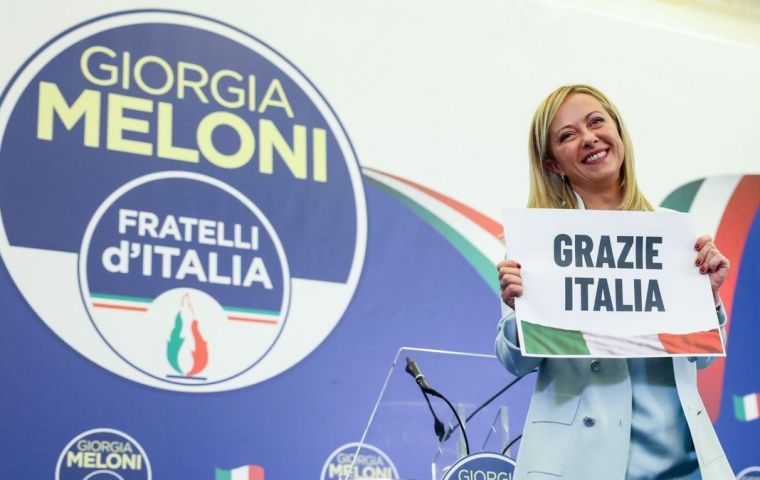MercoPress. South Atlantic News Agency
Italy jumps into the unknown after victory of Meloni's post-fascist party
 The vote count on Monday morning confirmed Meloni's clear lead, with more than 26% of the vote.
The vote count on Monday morning confirmed Meloni's clear lead, with more than 26% of the vote. Italy and the European Union entered Monday into a period of uncertainty after the victory in the legislative elections of Giorgia Meloni, at the head of a far-right and right-wing coalition that faces great challenges.
After obtaining an absolute majority in Parliament, the leader of Brothers of Italy (post-fascist) and her allies Matteo Salvini of The League (anti-immigration) and Silvio Berlusconi of Forza Italia (right-wing) will try to form a government in the coming days.
The vote count on Monday morning confirmed Meloni's clear lead, with more than 26% of the vote. His party became the first in the country, ahead of Enrico Letta's Democratic Party (PD, center-left) (19%).
With the League and Forza Italia, she will have an absolute majority in the Chamber of Deputies and in the Senate.
In his first speech after the election, Meloni promised to “govern for all” Italians. “We will do so with the aim of uniting the people,” he maintained.
The conservative press was jubilant on Monday. “Revolution at the ballot box,” headlined Il Giornale, the Berlusconi family's newspaper. ”The left defeated (we are) free!!!“, wrote the daily Libero.
”Meloni takes Italy,“ headlined La Repubblica, a left-wing daily that strongly opposed the Brothers of Italy leader during the campaign. La Stampa for its part referred to ”the thousand unknowns“ that open up in Italy after the ”historic victory“ of the far-right.
”The fact that this happens a month before the centenary of the march on Rome and the beginning of Mussolini's 20-year dictatorship is a coincidence: the Italians who voted for Meloni did not do so out of nostalgia for fascism,“ but the common factor between the fascist autocrat and Mrs. Meloni is that they come to power ”at the end of a lonely marathon against everything and everyone,” the Turin daily opined.
Economic challenges
The new executive will succeed the government of national unity led since January 2021 by Mario Draghi, the former president of the European Central Bank (ECB), who took the reins of the eurozone's pandemic-stricken third largest economy.
Draghi negotiated with the EU a financial aid of almost 200 billion euros, in exchange for his country carrying out deep economic and institutional reforms.
Despite the stakes, several parties that had agreed to be part of his government ended up toppling it this summer for purely electoral reasons, leading to the calling of early legislative elections.
“Super Mario”, presented as the savior of the Eurozone during the 2008 financial crisis, was seen as a guarantee of credibility by his European partners, but the coming to power of the nationalist, Eurosceptic and sovereigntist far right raises fears of a new era of instability.
The new government will have to manage the crisis caused by galloping inflation, while Italy is already collapsing under a debt that represents 150% of GDP, the highest in the euro zone after Greece.
The Milan stock exchange was rising this Monday morning, as markets had anticipated the victory of the post-fascist party. On Friday, it had fallen 3.36%, suffering the biggest drop among the major European stock markets.
The spread, i.e. the difference between the yield on ten-year German bonds (the European benchmark) and Italian bonds, rose 235 points on Monday, a sign of persistent concern among investors about Italy's debt.
AFP




Top Comments
Disclaimer & comment rulesCommenting for this story is now closed.
If you have a Facebook account, become a fan and comment on our Facebook Page!